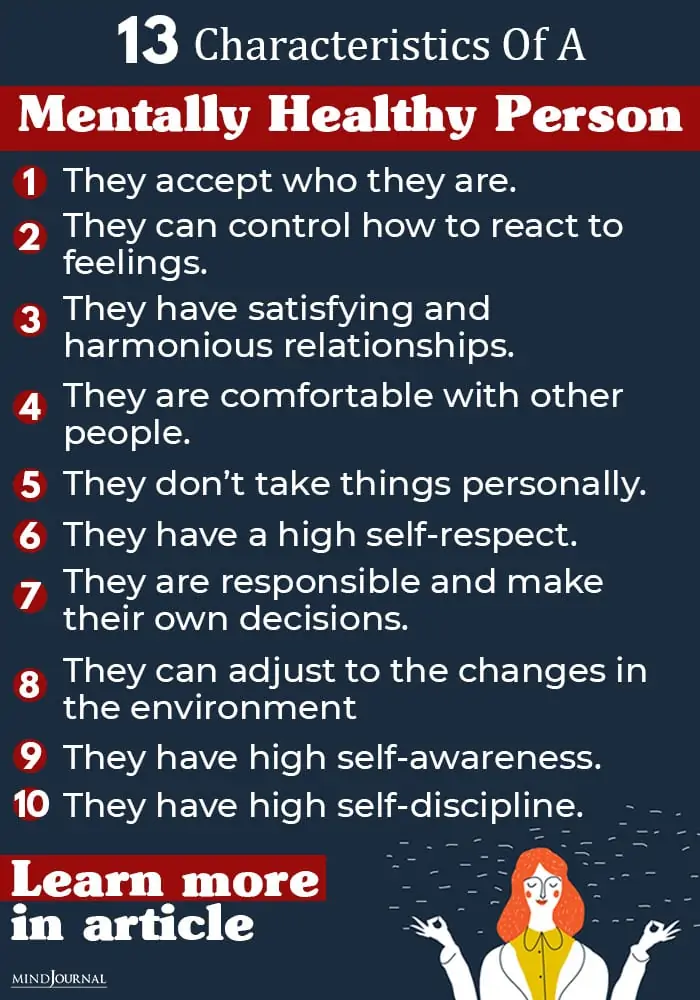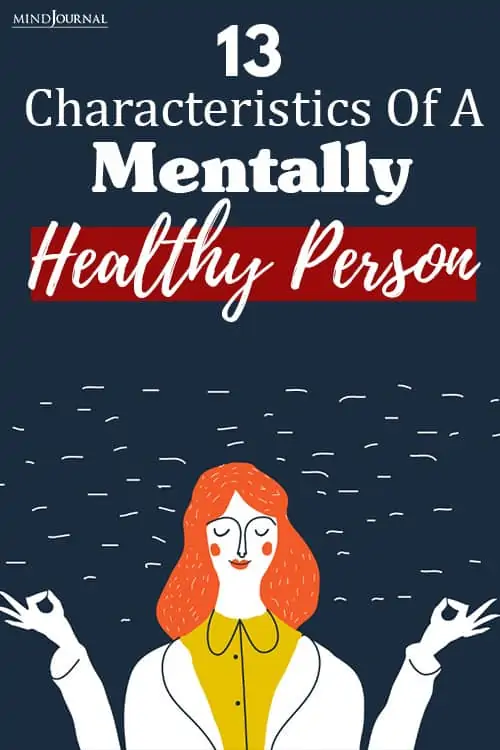Do you consider yourself to be a mentally healthy person? Read on to know the different factors influencing mental health and the characteristics of a mentally healthy person.
Mental health and substance use disorders affect 13% of the world’s population. It is estimated mental disorders are attributable to 14.3% of deaths worldwide, or approximately 8 million deaths each year. But, talking about mental health is still taboo in a number of countries.
Mental health is as important as physical health.
We at Mind Journal, have compiled a list of characteristics of a mentally healthy person.
If you are lacking one or more of the characteristics below, don’t feel low. You can always work on them and become a mentally healthy person. The key is to practice being mentally healthy every day.
Take one step each day and you will see a massive improvement in your mental and emotional health and wellbeing. Let’s get started.
Related: The Meghan Markle Interview: Are We Still Not Ready To Talk About Mental Health?
13 Characteristics Of A Mentally Healthy Person

1. They accept who they are
A mentally healthy person completely accepts himself. Such people are very much comfortable in their own skin, they know who and what they are.
Therefore, they always feel good and happy living their lives. You will never find them pleasing people or seeking approval. These are the basic characteristics of a sound mind.
Lack of self-acceptance is common in people who are prone to stress, anxiety, and different types of mental illnesses. They have issues with their own looks, dressing style, academic records, attitude, salary, and so on.
Thus, they are in a state of worry 24/7 thinking about what people will think about them. They are anxious while talking to people and often seek validation.

2. They can control how to react to feelings
This is one of the major attributes of a mentally healthy person.
Life is full of ups and downs and you can’t control everything. There is no point holding grudges, acting violent, or snuggling inside a blanket out of fear and anxiety. A mentally healthy person understands this fact very well.
So, they hardly waste time trying to control things that are not in their control. Instead, they work on how to react to their feelings and take positive actions when feeling certain negative emotions like aggression, jealousy.
It is these characteristics of a mentally healthy person that helps them heal faster and rise up even after hitting the rock bottom of life.
People without a sound mind have an illusion of a ‘perfect life’. There is nothing as such in this world. Therefore, these people are overwhelmed by negative emotions when disappointment strikes them. They fail to learn, let go and move on like those with a healthy mind.
3. They have satisfying and harmonious relationships
Robert Waldinger conducted one of the longest studies ever to find what makes a person happy and healthy. The bulk data that he generated in 80 years showed a surprising finding. “Good relationships keep us happier and healthier” – Said Waldinger.
Nurturing and maintaining satisfying personal relationships is one of the strong characteristics of a mentally healthy person. Please note that the quality of relationships is more important than the number of friends and relatives you have.
Strong social connections and deep bonding with loved ones make you physically healthier, live longer, and be happy according to Waldinger.
People who were mentally unhealthy were found to have high conflict marriages, unhappy relationships, and no one to count on at times of adversity. Their physical pain doubled with emotional pain and showed an early cognitive decline.
Healthy, warm, and close relationships have the ability to “buffer us from some of the slings and arrows of getting old,” Waldinger said.
Related: Depressed And Anxious Teens: Experts Give Practical Advice On How To Help (Including Checklists)
4. They are comfortable with other people
This is one of the wonderful attributes of a mentally healthy person. He who is comfortable in his own skin (see point 1) can also be comfortable with other people. People who always try to be their true selves, don’t go on to impress others.
Thus, they fully present whether saying hi to their new neighbors or when talking to a group of people. This quality helps them build social networks and make most of them for personal growth.
People who hate themselves or their own life state struggle to make new friends/colleagues. They are neither socially adjustable nor emotionally mature. They are never optimistic, they hesitate to seek help at times of emergency, which delays them in reaching their goals.

5. They don’t take things personally
Have you seen people laughing at their own mistakes? Nothing to be surprised about! People who accept and love themselves for who they are always feel good and worry less. So, they don’t take negative comments or criticism by heart.
A person with a healthy mind can easily laugh at their own flaws and themselves. Because they are optimistic and have good control over – how they respond to an event, their emotions, and their energy level. One of the most interesting traits of a mentally healthy person, isn’t it?
Pessimistic people are not mentally sound because they never feel good about themselves. They project their own doubts and insecurities on other people. Even a silly joke hurts them deeply.
6. They have high self-respect
A mentally healthy person not only respect themselves but their friends, family members, and even strangers. They talk to people in a level-headed way even when there are differences in opinions, views, and perspectives towards life.
Just like they value, respect, accept and love themselves, they understand that it important to respect and accept others for who they are. Those with mental ill-health, neither respect themselves, nor can respect others.
They are programmed to think negatively, so they find flaws in others, feel personal attack when opinions don’t match and exhibit disrespectful behavior.
7. They are responsible and make their own decisions
Responsibility is another one of the major characteristics of a mentally healthy person. They take accountability for their mistakes and complete responsibility for their lives.
They realize that their thoughts, feelings, behavior, and actions shape their life and future. So, whether it is a decision about a brand of clothes to choose or buying a property, they make informed decisions, wise judgment, and live with the results. No blame game!
People with unhealthy minds never accept their flaws. They have an unrealistic approach towards their life. Make impulsive decisions based on immediate situations and benefits. And, never think before speaking or acting only to end up in a vicious cycle of pain and loss.
Related: 5 Things You Can Try to Improve Your Mental Health
8. They can adjust to the changes in the environment
Adjusting to people, situations, and surroundings is one of the prime characteristics of a mentally healthy person. Adaptation is what makes plants and animals successful in a particular environment. For example – A toad camouflage to blend with the surroundings so that it can disguise the predator.
Similarly, a person with a healthy mind can change the environment for the greater good as well as adjust to new changes if the situation demands. Such healthy behavior spikes the rate of growth, success, and well-being.
People with poor mental health are overwhelmed with new changes or situations. They fail to adjust with society due to victim mentality and ultimately thrive in an environment that doesn’t maximize their odds of success.
9. They have high self-awareness
Self-awareness is also one of the crucial characteristics of a mentally healthy person. Regular self-assessment, self-reflection, introspection, and retrospection help a person better know his/her strengths, weaknesses, feelings, thoughts, values, abilities, power, and areas of improvement.
High knowledge about self translates to high mental clarity, focused attitude, and ability to make the right choices in life. Emotional awareness helps you express a wide spectrum of emotions. As a result, a healthy mind knows the difference between emotional expression and emotional self-control.
People who are mentally unhealthy have poor self-awareness and consequently poor self-identity. Most of the time they don’t know what they feel, what to do and what they want.
They can’t express their emotions to others, bottle up everything and pile up frustration. Hence, they remain confused, stressed, anxious, unmotivated, and depressed as well as prone to various social and psychological problems.
10. They have high self-discipline
A simple act of creating a to-do list in the morning and striking off before bed gives a feeling of achievement and satisfaction. Isn’t it? Now when you continue this habit every day, it creates a positive feedback loop.
This means, you will have improved mood and a greater feeling of self-empowerment, which will program your mind to take further beneficial actions.
You will notice that self-discipline is one of the common qualities of a mentally healthy person. And it is the getaway for success and happiness!. That said people who are mentally healthy don’t force themselves to have a disciplined life. Rather it comes naturally to them and they seem to love it.
High self-discipline allows a person to do things that are important and necessary even when not willing to do so. But, mentally unhealthy people fail to practice self-discipline and succumb to laziness, procrastination, chronic indecision, helplessness, and feel that life is out of control.
11. They have high-self-confidence
A mentally healthy person never falls short of self-confidence, because they accept themselves for who they are. Since they have high self-awareness, they make the best use of their strengths and weaknesses.
Thus, they always know what they are doing and why. They will march forward even through obstacles and come out victorious.
People without a healthy mind lack clarity about themselves and are always clueless about where their life is leading to. Fears, insecurities, and irrational thoughts crash their self-esteem and self-confidence.
They are uncertain about their decisions and results. They try to play safe and withdraw from the world even for minor problems and miss profitable opportunities knocking at their door.
Related: What’s The Difference Between Self-Centeredness, Selfishness, and Self-Awareness?
12. They can face rejections gracefully
Resilience is one of the master characteristics of a mentally healthy person. They know ups and downs are part of life, so they are always prepared for rejections and failures.
They can adjust to any sort of situation and environment and will adapt like a toad. Blessed with resilience and flexibility, they can face any rejections gracefully and remain in high-life state condition.
Regrets and guilt are not their cups of tea! With each rejection, they grow physically and psychologically stronger.
People who are not mentally sound cannot process their emotions or practice self-care. They don’t nurture healthy relationships that can motivate and polish their mindset from time to time. They take rejections personally and become emotionally weaker.
13. They are creative in thinking
One of the best qualities of a mentally healthy person is that they’re full of positive thoughts and hope. Their mind has no noise or clutter but functions efficiently. Therefore, they are creative thinkers.
Be it work or solving problems, they can think out of the box and try some new stuff. Always in high spirit and full of passion, they are genuinely interested in creating something new and always ready for adversities.
Sure, there are a number of well-known creative people, primarily in the arts, who have been mentally ill—for example, Vincent Van Gogh, Sylvia Plath. But, scientific studies show that – this creativity drops back down to average levels or lower during severe episodes of illness.
Think why did Linkin Park frontman Chester Bennington commit suicide? Considering several factors that influence mental health, some may cope but most people with mental ill-health may not be able to face adversity at any cost.
These are positive behaviors, habits, and characteristics of a mentally healthy person. In case you haven’t noticed, being mentally healthy is more than the absence of depression, anxiety, or any other mental illness.
A healthy mind is all about what you think of yourself, how you live your life, respond to life’s challenges, build relationships, cope with setbacks, and perform day-to-day activities.
Can you relate to these attributes of a mentally healthy person? Do you think you are a mentally healthy person?
Related: 20 Things Highly Creative People Do Differently
If yes, kudos to you! If not, then please work on yourself and consult a mental health professional if needed. It is important to practice being mentally healthy every day.
Change your mind, change your life!
Please share this article with anyone who you may think will find it valuable and helpful.
Frequently Asked Questions
What percentage of the world suffers from mental illness?
According to the World Health Organization, around 20% of children and adolescents across the globe have a mental health condition. As per the 2020 report, almost 1 billion people are suffering from a mental disorder, and every 40 seconds one person commits suicide.
What are the physiological causes of mental illness?
Psychological causes of mental illness are – emotional abuse or any other trauma, early loss such as the death of a parent, emotional neglect, poor ability to connect with others, stress, and hopelessness.
References:
Mental health, Our World in Data Key substance use and mental health indicators in the United States, Substance Abuse and Mental Health Services Association Mortality in mental disorders and global disease burden implications, JAMA Psychiatry Substance Abuse and Mental Health Services Administration. Risk and protective factors for mental, emotional, and behavioral disorders across the life cycle. Wu, I.H., Bathje, G.J., Kalibatseva, Z., Sung, D., Leong, F.T. and Collins-Eaglin, J., 2017. Stigma, mental health, and counseling service use: A person-centered approach to mental health stigma profiles. Psychological services, 14(4), p.490. Lamblin, M., Murawski, C., Whittle, S. and Fornito, A., 2017. Social connectedness, mental health and the adolescent brain. Neuroscience & Biobehavioral Reviews, 80, pp.57-68. Walker FR, Pfingst K, Carnevali L, Sgoifo A, Nalivaiko E. In the search for integrative biomarker of resilience to psychological stress. Neurosci Biobehav Rev. 2017;74(Pt B):310-320. doi:10.1016/j.neubiorev.2016.05.003 Umberson D, Montez JK. Social relationships and health: a flashpoint for health policy. J Health Soc Behav. 2010;51 Suppl(Suppl):S54–S66. doi:10.1177/0022146510383501 Kashdan TB, Rottenberg J. Psychological flexibility as a fundamental aspect of health. Clin Psychol Rev. 2010;30(7):865–878. doi:10.1016/j.cpr.2010.03.001










Leave a Reply
You must be logged in to post a comment.